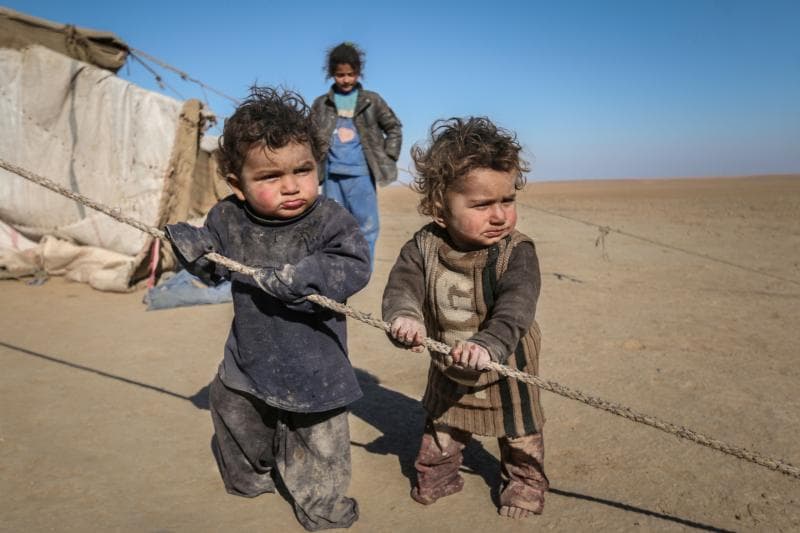ROME – As Syria’s civil war stretches further into its ninth year with no clear end in sight, those working to alleviate the country’s crippling humanitarian crisis have criticized the international community for using refugees as pawns in political games, saying it lacks the will to pacify the situation.
Speaking to Crux, Giampaolo Silvestri, secretary general of the AVSI foundation, which sponsors development projects in needy areas throughout the world, said, “there is absolutely an instrumentalization of the poor people who live in Syria.”
As conflict rages on, people are being forgotten, he said.
“On one hand there’s American disinterest, but on the other there’s also general European disinterest, and this leaves the door open to games from Turkey, Iran, [and] Russia.”
“By now they are playing games confronting and fighting one another,” he said, adding that in his view, “there is no real will” in the international community to cease fighting and begin rebuilding pacified areas. If such will existed, he said, “the reconstruction would have (already) begun.”
As Syria’s bloody civil war nears the decade mark, forces loyal to Assad have largely retaken the country with the exception of the northwestern province of Idlib, and government forces are presently pounding the area ferociously, backed by Russian and Iranian support.
Fighting in the area has caused a catastrophic humanitarian crisis which so far has prompted some 700,000 people to flee with many making their way to the Turkish border. So far, watchdog groups estimate that roughly a quarter of the three million people in Idlib and surrounding areas have fled. The UN Office for Humanitarian Affairs (OCHA) expects this number to rise, should the fighting escalate.
In October, United States President Donald Trump pulled U.S. troops out of Syria. Shortly after, Turkish President Recep Tayyip Erdogan launched an incursion along the Syria-Turkey border on grounds that he was establishing a “safe-zone,” allowing the return of Syrian refugees currently living in Turkey.
Erdogan has asked that the European Union provide aid to create the buffer zone, however, he also frequently threatened to reopen northern migrant routes into Europe, rekindling fears that the continent could see a revival of the massive migrant crisis of 2015.
On the other hand, Russia has also bargained with certain European nations, such as France and Germany, saying it would facilitate the return of refugees to Syria if the E.U. backs Assad and funds reconstruction.
With some two million refugees in Turkey, 1.5 million in Lebanon and some 600,000 in Jordan as political back-and-forth continues, Silvestri said “there is absolutely an instrumentalization of these poor people,” insisting that reconstruction would help stabilize Syria and its neighboring countries.
“It’s important for the reconstruction to begin, because once reconstruction begins, refugees can return. Perhaps not all, but it would make this instrumentalization less possible,” he said.
In a recent interview with AsiaNews, Italian Cardinal Mario Zenari, the pope’s ambassador in Syria, stressed the importance of humanitarian outreach, saying this is one of the Catholic Church’s “main missions” in Syria.
The poor, the sick and the hungry “are knocking on our doors,” he said, noting that there are more than 13 million people who have been impacted by the war and are in need of humanitarian assistance, food and medicines.
“More than half of Syria’s population are in need,” he said, adding that the Church, while small in number, is “on the front line to meet basic needs, bring medicines, help against the cold. Here the temperatures are below zero and the distress is great; the cold compounds the hunger.”
One project AVSI sponsors that Zenari has been involved in is the Open Hospitals initiative, which provides medical care for those living in poverty and supports the activities of three Catholic non-profit hospitals in Syria.
According to Silvestri, half of Syria’s hospitals are currently out of commission, making the need for medical care, particularly in conflict areas, where hospitals are often a target and eight in 10 people live in poverty, desperate.
So far, some 30,000 people have been treated at the Open Hospitals facilities, most of whom are Muslims given that Christians are a small minority in Syria. The goal is to eventually reach 50,000 people.
“We are looking for resources to continue, but things are progressing well. There is still need for healthcare,” Silvestri said, adding that people from Idlib are also making their way to the Open Hospitals facilities in Aleppo and Damascus.
With the situation on the ground not showing any improvement, Zenari insisted that “We shall have to continue our efforts and deal with the health emergency,” adding that it is crucial “to keep our eyes on Syria and not let the curtain fall” on the tragic situation that continues to unfold in Syria.
“The worst way of being killed,” he said, “is by silence and indifference.”
Follow Elise Ann Allen on Twitter: @eliseannallen
Crux is dedicated to smart, wired and independent reporting on the Vatican and worldwide Catholic Church. That kind of reporting doesn’t come cheap, and we need your support. You can help Crux by giving a small amount monthly, or with a onetime gift. Please remember, Crux is a for-profit organization, so contributions are not tax-deductible.













